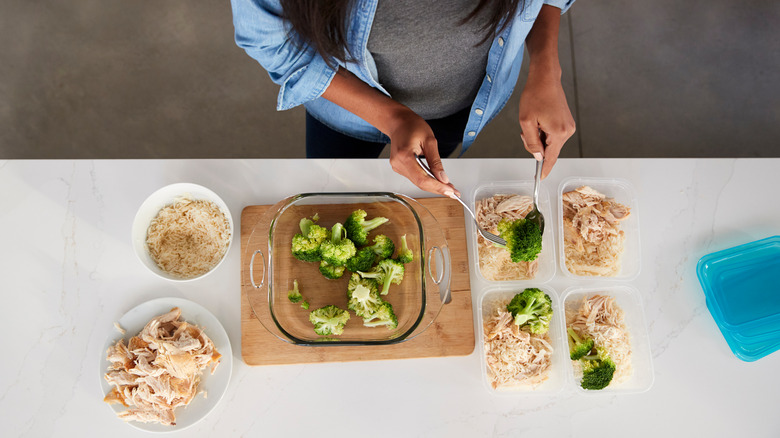Can You Eat Too Much Chicken?
Since the 1980s, chicken has been the star of the meal due to warnings about saturated fats in meats and health concerns about regularly indulging in red meat (per Eat This, Not That!). Heeding physicians' warnings, chicken has become a regular staple across the country. Fried, grilled, boiled, baked, nugget shaped — chicken is versatile in its flavors, sizes, and tastes. It's readily available in grocery stores, fast food chains, and it's convenient to whip up after a long workday. That's probably why the National Chicken Council estimated in 2022 that the average person will consume about 98 pounds of chicken. With such a high number, it's no wonder we're curious if you can eat too much chicken.
At the moment, there is no scientific evidence that chowing down regularly on chicken will have adverse effects on your overall health, per CookingLight. However, counting chickens is an excellent idea, as Men's Health recommends eating no more than 450-550 grams of chicken daily. Over 550 grams, runs the risk of neglecting other nutrients from protein sources like eggs, fish, or red meat. Keep in mind your body can only process so much protein, and you need to eat a variety to stay both healthy and balanced.
What's the healthiest way to prepare chicken?
While chicken is a clear winner for being a great source of protein (26 grams per four ounces, to be exact), low in calories (120 calories raw) and low in fat (1 gram), all chicken is not created equal (per CookingLight). Thinking savory, spicy chicken wings and old fashioned boiled chicken carry the same nutritional value would make you ... wrong. According to Cleveland Clinic, the skin on poultry is high in saturated fats. These fats increase your chances of heart disease, so the American Heart Association recommends that diets contain no more than 5 to 6 percent of saturated fats. So, skip the deep frying, charring, barbecuing, roasting, or pan-searing your chicken – Healthline claims these cooking methods are the least healthy because they create substances called carcinogens.
To reap all the nutritional benefits of chicken, avoid open flames and instead cook your chicken using water-based methods. Steaming, pressure cooking, and microwaving are the healthiest ways to prepare chicken, according to Healthline. Another healthy option is to prepare sous vide chicken. Place seasoned chicken in an air-tight, food grade pouch, and then add this pouch to boiling water to cook for about an hour.


